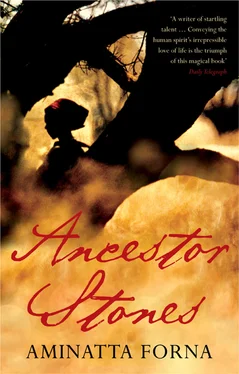With me I carried my gifts for the baby. But what would I say to her? How would I explain that her great-grandmother, who had lived for longer than eighty years, had learned nothing at all, had no knowledge to give? That she had arrived in a world where suddenly we were all lost, as helpless as newborns.
17 Mariama, 1999: Twelfth Night
Kuru Massaba made the world and placed it upon the head of a great giant. This is what Pa Yamba told me once. Every day the giant turned himself slowly from east to west and then slowly turned himself back again. People lived on the earth and should have been happy, for everything they needed was there. But they fought among themselves and their anger caused pain to the giant in the form of terrible headaches. He shook his head to free himself of the torment and brought down great storms that only tormented him more. In time the pain became unbearable. The giant lay down, grew sick and died, the world became dark.
This is what we know happened to the world. I told Mr Lockheart this story. And this is the story I will tell you, the last one.
‘Go on, Mary,’ he said.
Kuru was angry. So angry he turned his face away. But when he heard the distress of the dying people on the darkened earth, his heart softened. He forgave them, he placed the world upon the head of another giant who turned from east to west every day. He pushed all the bad spirits into the underworld, and gave the rest of the world to human beings, because he loved them. But Kuru is disappointed again, because we will not love him the way he wishes to be loved.
Sometimes the giant stumbles. You can feel it. He is weakening. Every time he stumbles the earth is shaken, it crumbles and cracks. The spirits in the darkness down below are woken.
‘What will happen then, Mary?’ Mr Lockheart liked to use my name a great deal, and to look me in the eye as he did so. I had expected this, I wasn’t offended by it. I quite liked him.
I replied: ‘If you would like to call me by my name, it is Mariama.’
‘I will, if that’s what you would like. I thought Mary was your Christian name. Why do you call yourself Mariama?’
Yes, Mary is my Christian name. That’s exactly what it is. That’s all it is.
Mariama was the name given to me. The nuns took it away and replaced it with something that sounded like my name, that I learned to answer to. It was easier to remember, they said. For whom? I might have asked. And why did I need a name that was easy to remember? Perhaps they thought we weren’t worth the effort. Or that it was presumptuous of a little pagan baby to walk through life trailing a name of four syllables, flagrantly, like an ermine cloak or a silk scarf, something that should only be worn by the most important people. But Mary wasn’t mine. It never had been. Mariama was the name my mother had chosen for me.
Some of this I said out loud. Some I kept to myself.
Mr Lockheart nodded: ‘I see. Mariama it is. And you must call me Adrian.’
He glanced down at the desk, I could see he wanted to pick up his pen and make some notes about me. He wasn’t sure. Now he was masking his hesitation by pretending to look like he was thinking about something. He was new, had only been here a few months. But he thought that if he was calling me by my first name, I should call him by his. They all did that, so they could feel they were treating us like equals.
As a matter of fact, if it were up to me I would tell him to call me Aunty Mariama. Because at his age he ought to show a little respect. That’s if it were up to me. But it isn’t.
I think of that giant turning slowly round. From east to west, from west to east. Endlessly revolving. I wonder if that is why our lives so often end up in the same place they began? Because life is not a straight line, just as the earth isn’t flat. You don’t walk and walk until you reach a place you know is the end. Like the Europeans once believed. They thought if they sailed their ships towards the horizon they would plummet off the end in a cascade of water. Then came Galileo. And after that they found us here, clinging on to the curve of the earth. What took them so long? I sometimes wonder. We knew the earth was round long before that.
No, life isn’t a straight line. It is a circle, whose slow and gentle bend we fail to spot, until we realise we are back where we started. I don’t know when I realised I knew this, but it was some time before I met Adrian Lockheart.
The next time, Adrian Lockheart asked: ‘Do you believe in ghosts?’
‘You mean like the Holy Ghost.’
‘Are you teasing? It’s OK if you are. I don’t mind. And I take your point, Mary.’
‘Mariama.’
‘Mariama.’ A pause. ‘I mean ghosts, spirits, devils.’
He is trying to understand, and despite myself I would like to help him. He has read newspapers and scholarly reports about us. And he has been talking to the others who come here. He will have been out drinking with them, which I know is where he was last night. I saw him: leaning across the table, hovering above the pools of beer stretched out on the plastic. He is the new boy. The others enjoy the fact, they can pretend to be old Africa hands. Tales of cannibals and juju. If ever they see a shadow of scepticism on his face they shake their heads knowingly. ‘I’m telling you. Just like that. Dead. Convinced someone had placed a curse on him, doesn’t matter how educated. I’ve seen it before. Rwanda. The Congo.’
He thought he would be working with child soldiers. Or at the very least the limbless, the lipless, the eyeless, the tongueless. Instead he got me. But he was a good man, and determined to make the best of it.
I asked what his own opinion was, since he was the Spiritual Advisor.
‘I’m really a counsellor, that’s just a fancy title.’ He smiled when he said that.
So I told him, no, I wasn’t teasing.
March is the warmest month of the year, and this was the warmest March for many years to come.
We used to meet on Friday mornings, eleven o’clock. His office had bare walls and a concrete floor, a bare light bulb descended from the ceiling on a three-foot, brittle cord. Too low, so each time he passed it he was forced to duck slightly. A small pink burn showed on his forehead. A desk, five chairs, one of which was broken and pushed against the wall. One he sat on. The other three, of variable height, were placed in a row in front of his desk. The middle one was directly opposite him, soft but too low slung, it left you peering across the surface of the desk at him. Choosing either of the others meant you would be at eye level, but off-centre. I chose the one that was closest and sat down, looking at him sideways on.
He turned his chair to face me. My skin prickled under his gaze, so I stared straight ahead of me at the wall, or else out of the window. Sometimes he turned to see what I was looking at. But there was nothing to see. Just a badly built wall with dried concrete oozing out between the breeze blocks and a trail of withered bougainvillea.
He suffered in the heat, clawing at his collar; the back of his shirt was soaked with sweat and stuck to the plastic chair. Still, he refused to give in to it. Every day a tie, a long-sleeved shirt, and a jacket that hung uselessly over the back of his chair.
Our sessions ended when the day was at its hottest.
‘Quick! What’s the first thing that comes into your mind.’ As if we were playing a game. So I told him about my niece, whose child had died. He asked me how I felt about that. I told him I was sorry for my sister’s daughter, she had wanted this child very much.
‘Some people believe these things are just God’s will, Mariama.’ Adrian said in his hushed voice.
Читать дальше












